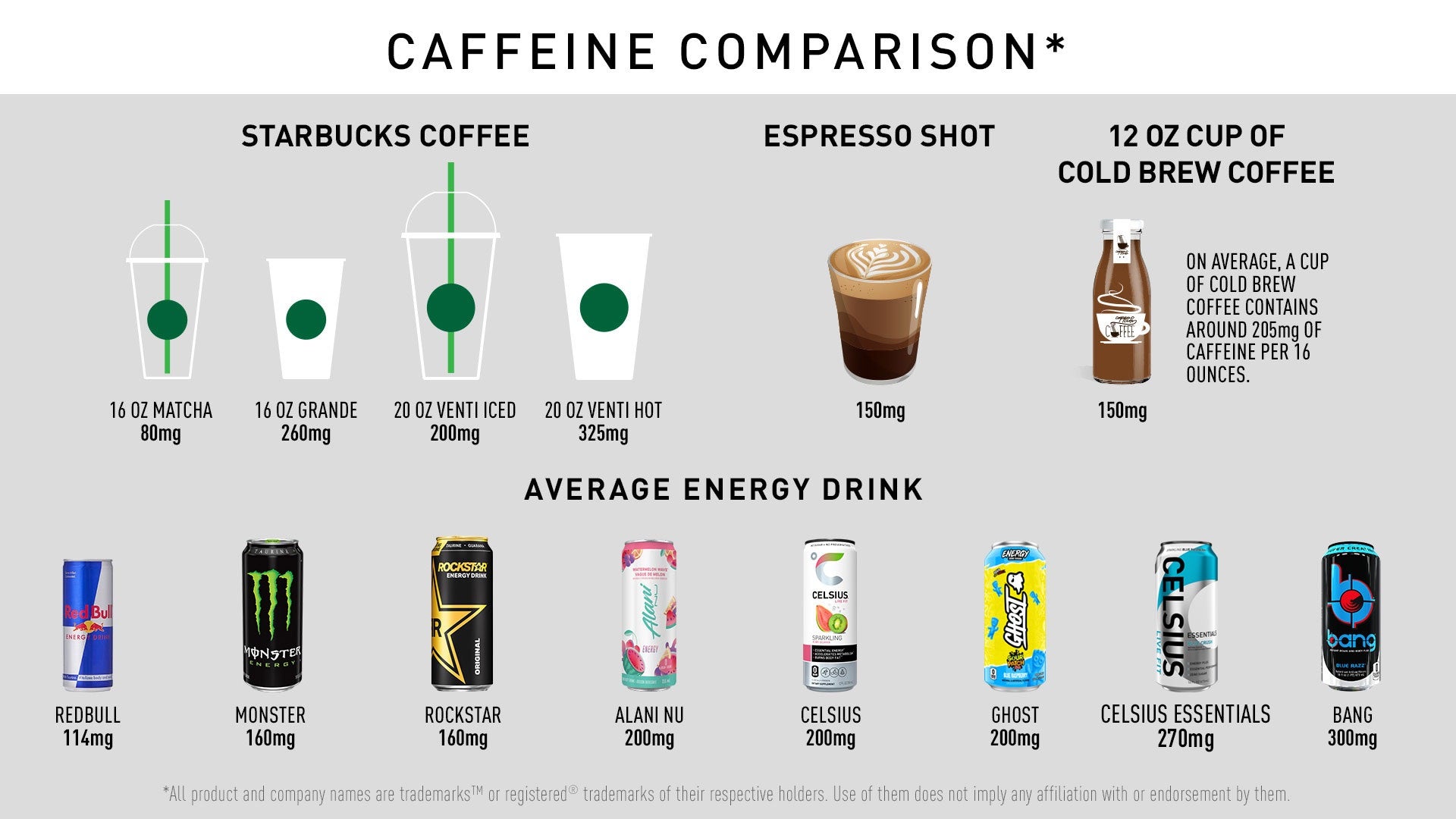
The energy drink market is vast, but few products are formulated with the precision and purpose of Next Level Energy. It's a uniquely crafted beverage, centered on the synergy between amino acids, B Vitamins, and carefully chosen sweeteners.
Why should you choose Next Level Energy over other options? Let's delve into the science and benefits behind each ingredient to understand the magic behind this energizing concoction.
Next Level Energy Drink: Caffeine Content & Essential Facts
Caffeine Overview
Next Level Energy Drinks are designed as a base concentrate, meant to be diluted with water to create a customizable energy drink that fits your needs. With 80mg of caffeine per 1 oz. of concentrate, it allows for flexibility in creating the perfect energy drink, depending on your desired strength and flavor intensity.
Caffeine Content per Serving
Each 1 oz. of Next Level Energy Drink concentrate contains 80mg of caffeine, which can be mixed with water to your preferred ratio.
- Serving Size (Concentrate): 1 fl. oz.
- Caffeine per Serving: 80mg
- Recommended Dilution: Mix with sparkling water or other beverages to create a customized energy drink
- Caffeine Source: Caffeine from Green Coffee
How Does This Compare?
- A typical cup of coffee contains about 95mg of caffeine per 8 oz.
- Standard energy drinks usually range from 80mg to 300mg per serving.
- With Next Level’s concentrate, you control the strength, making it a versatile and customizable energy drink solution.
Health-Conscious Energy
Next Level doesn’t just provide energy; it also supports overall wellness. The concentrate is fortified with B-vitamins and amino acids, ensuring that you're not only energized but also supporting your body’s hydration and recovery.
Who is Next Level For?
Next Level is perfect for those looking for a flexible, clean, and health-focused energy option. Whether you're an athlete, a student, or a busy professional, you can tailor your drink to match your energy needs, making it a versatile choice for any lifestyle.

The Science Behind Next Level Energy
Essential Amino Acids
-

- Promotes Relaxation: known for its ability to promote relaxation and calmness without inducing sleepiness. This makes it popular for those looking to manage stress and anxiety.
- Improves Sleep Quality: While it doesn't act as a sedative, L-Theanine can help improve the quality of sleep. It does this not by making you fall asleep more quickly, but by helping you have a more restful sleep.
- Enhances Cognitive Function: There is evidence to suggest that L-Theanine, especially when combined with caffeine, can improve focus, concentration, and cognitive performance. This can be particularly beneficial for tasks that require extended periods of focus.
- Boosts Immune System: Some studies suggest that L-Theanine may help strengthen the immune system, potentially making you less susceptible to common colds and other illnesses.
- Potential Mental Health Benefits: Preliminary research indicates that L-Theanine may have positive effects on mental health, including reducing symptoms of depression and anxiety. However, more research is needed in this area.
- Cardiovascular Health: L-Theanine may help lower blood pressure in people with high blood pressure, thereby contributing to overall cardiovascular health.
- Synergistic Effects with Caffeine: Often found in tea, L-Theanine can counterbalance some of the less desirable effects of caffeine, such as jitters or restlessness, providing a more balanced energy boost.
-

- Energy Production: L-Carnitine is crucial for energy production. It transports long-chain fatty acids into the mitochondria of cells, where they are burned for energy. This makes it particularly important for muscle movement, heart and brain function, and other bodily processes.
- Heart Health: Some studies suggest that L-Carnitine may benefit heart health. It has been linked to improvements in patients with heart conditions, such as coronary heart disease and chronic heart failure.
- Exercise Performance: L-Carnitine can enhance exercise performance by increasing blood flow and nitric oxide production, leading to improved oxygen supply to muscles. It also may reduce muscle soreness and recovery time post-exercise.
- Weight Loss: While L-Carnitine is often marketed for its fat-burning capabilities, the evidence is mixed. It might aid in weight loss for some individuals, especially when combined with exercise.
- Diabetic Health: L-Carnitine may also have benefits for those with diabetes by improving glucose metabolism and insulin sensitivity.
B Vitamins
-

Vitamin B3
- Lowers Cholesterol: Niacin is well-known for its ability to lower bad cholesterol (LDL) levels and increase good cholesterol (HDL) in the bloodstream, which can reduce the risk of heart disease.
- Supports Skin Health: It can help improve skin health and is often used in treatments for certain skin conditions, including acne and sun-damaged skin.
- Boosts Brain Function: Niacin plays a role in brain health and may help protect against Alzheimer's disease and other age-related brain disorders, though more research is needed.
- Improves Digestion: Niacin aids in the normal functioning of the digestive system, helping to break down food and convert it into energy.
- Reduces Symptoms of Arthritis: Some studies suggest that niacin can improve joint mobility and reduce inflammation, potentially benefiting people with arthritis.
-

Vitamin B6
- Metabolic Function: Vitamin B6 plays a crucial role in metabolism, helping to break down proteins, fats, and carbohydrates and converting them into energy.
- Brain Health: It is involved in the production of neurotransmitters, which are chemicals that transmit signals in the brain. This is essential for brain development and function, and may impact mood regulation.
- Immune Function: B6 is important for maintaining a healthy immune system. It helps in the production of antibodies and aids in the regulation of immune responses.
- Hemoglobin Production: Vitamin B6 is involved in the creation of hemoglobin, which is the protein in red blood cells that carries oxygen throughout the body.
- Reduces Risk of Heart Disease: By assisting in the regulation of homocysteine levels (an amino acid linked to heart disease), B6 may help reduce the risk of heart-related issues.
-

Vitamin B7
- Stengthens Hair and Nails: Biotin is well-known for its role in strengthening hair and nails, making it a popular supplement for those looking to improve their hair and nail health.
- Supports Metabolism: Biotin assists in metabolizing carbohydrates, fats, and proteins, converting food into energy and supporting overall metabolic health.
- Regulates Blood Sugar: It may help regulate blood sugar levels, which is particularly beneficial for people with diabetes. Biotin's role in carbohydrate metabolism can influence the body's response to blood sugar levels.
- Promotes Fetal Development: Biotin is important during pregnancy as it supports embryonic growth and development.
- Boosts Skin Health: Similar to niacin, biotin is also beneficial for maintaining healthy skin. It plays a role in keeping the skin moisturized and appearing healthy.
-

Vitamin B12
- Red Blood Cell Formation: Vitamin B12 is essential for the production of red blood cells. A deficiency in B12 can lead to anemia, which causes fatigue and weakness.
- Brain and Nervous System Health: B12 is vital for neurological function, playing a role in maintaining the health of nerve cells and supporting the production of DNA and RNA.
- Energy Boost: Like other B vitamins, B12 helps in the conversion of food into glucose, which is used for energy. It can thus play a part in improving energy levels.
- Supports Bone Health: Some studies suggest that adequate B12 levels may be important for bone health, potentially reducing the risk of osteoporosis.
- Mood Regulation: B12 is involved in the synthesis of brain chemicals that influence mood. There is ongoing research into its role in supporting mental health and possibly reducing the risk of depression.
- Heart Health: Vitamin B12, along with B6 and folate, helps control homocysteine levels, potentially reducing the risk of heart disease.






